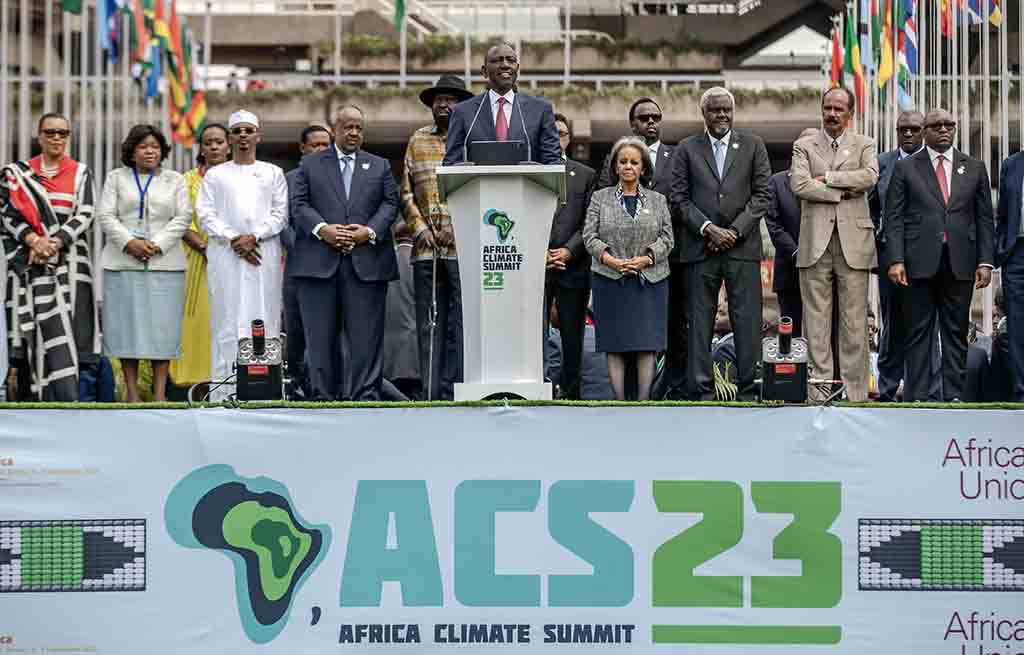The Nairobi Declaration, which was born out of the Africa Climate Summit, outlines a set of key demands and aspirations that reflect Africa’s urgent need to address climate change challenges and carve a sustainable future. It capped the three-day Africa Climate Summit which was dominated by discussions of how to mobilise financing to adapt to increasingly extreme weather, conserve natural resources and develop renewable energy. The historic summit marks Africa’s unified voice in the global climate discourse.
Below are the key declarations from the summit.
Global Carbon Tax Regime: A Call for Climate Finance
One of the pivotal calls in the Nairobi Declaration is for global leaders to support the establishment of a comprehensive carbon tax regime. This regime would encompass taxes on fossil fuels, maritime transport, and aviation, augmented by a global financial transaction tax (FTT). Such a system would make financing for green growth more affordable and accessible. Importantly, it could shield climate-related investments from tax fluctuations influenced by geopolitical and domestic political pressures. While the concept of a global carbon tax has faced resistance, several countries have already adopted similar measures.
$600 Billion for Renewable Energy: Bridging Africa’s Energy Gap
Africa grapples with a vast energy deficit, with 600 million people lacking access to energy and over 900 million without clean cooking solutions. The Nairobi Declaration issues a clarion call for a massive investment of $600 billion to achieve an ambitious renewable energy target of 300 Giga Watts (GW) by 2030, a significant leap from the current capacity of 56 GW. This declaration underscores the importance of aligning global financial resources to support the sustainable utilization of Africa’s abundant natural resources, facilitating increased investment in renewable energy. Historically, Africa has attracted only a fraction of global renewable energy investments ($60 billion out of $3 trillion) over the last decade. To attract more funding and expand generation capacity, the declaration encourages the scaling up of demand for renewable energy and the relocation of energy-intensive primary processing to the continent.
Restructuring the International Financial System: Reform and a New Charter
The Nairobi Declaration advocates for reforms in the multilateral financial system and the creation of a Global Climate Finance Charter by 2025. It urges multilateral development banks to increase concessional lending to poorer nations and calls for more effective utilization of the IMF’s special drawing rights mechanism, which issued $650 billion as part of the Fund’s COVID-19 response. Additionally, the declaration proposes measures to help highly indebted countries avoid default, including instruments that could grant 10-year grace periods and extend sovereign debt tenors.
Green Minerals and Economic Transformation
While the summit deliberated on the role of Africa’s key mineral resources in driving economic transformation, the Nairobi Declaration does not prominently emphasize these strategic minerals or integrate them into the vision for green growth.
A New Beginning for Africa’s Climate Politics
The Africa Climate Summit signifies a groundbreaking moment as it is the first time the continent has united specifically to address the climate crisis, focusing on challenges and solutions on its own terms. In closing, President Ruto, the summit’s host, aptly stated, “The cradle of humanity, Africa, is also its future. What Africa wants is what the world needs.” The Nairobi Declaration serves as a testament to Africa’s determination to shape its climate destiny and contribute meaningfully to global climate action.
Story was adapted from UN Climate Summit.
